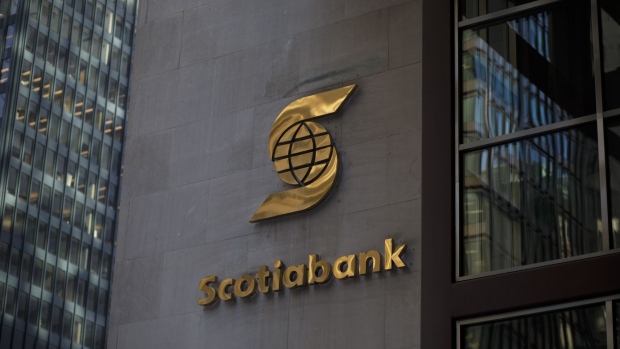Nov 30, 2021
The Daily Chase: Scotia beats and shares the wealth; Moderna vaccine uncertainty
By Noah Zivitz

Bank of Nova Scotia is taking full advantage of its newfound capital freedom while reporting a big profit beat to end its fiscal year. The bank announced plans this morning to repurchase up to 24 million of its shares and also said the quarterly dividend is going up 11 per cent to $1.00 per share. That came alongside profit that climbed to almost $10 billion for the full fiscal year, while fourth-quarter adjusted earnings easily outpaced expectations amid gains in all of Scotia’s divisions – notably including a doubling in profit from its international unit.
RENEWED OMICRON FEAR SHAKES MARKETS
Yesterday’s relief rally has given way to another wave of unease about the new COVID-19 variant. Major European markets and U.S. futures have come under pressure, with fingers being pointed at Moderna’s chief executive, who told The Financial Times he thinks there’s “going to be a material drop” in his company’s vaccine effectiveness against the Omicron variant, while also stating the world has to wait for data to accurately make that assessment. Somehow, that appears to have been enough to make traders/algorithms forget that one of Moderna’s other executives just yesterday said a modified vaccine could be available early next year if that’s necessary … not to mention that Moderna co-Founder Noubar Afeyan told our Bloomberg Television partners his team has a “comprehensive plan” with “a lot better weapons” for precisely this type of scenario.
COVID CLOUDING ECONOMIC OUTLOOK
The good news for Canada: growth far outpaced expectations in the third quarter as annualized gross domestic product rose 5.4 per cent. Economists were expecting just 3.0 per cent. And Statistics Canada is estimating growth jumped 0.8 per cent in October. But as Citi Economist Veronica Clark told us in instant analysis, those numbers already feel stale given today’s concern about the Omicron variant. Indeed, on that front, U.S. Federal Reserve Chair Jerome Powell will tell lawmakers today that the new variant poses “downside risks to employment and economic activity and increased uncertainty for inflation.” Good opportunity to point out that the Bank of Canada will get its turn to comment on COVID next Wednesday with the release of a policy decision.
$2,200,000,000,000 IN CONSUMER DEBT
That's the national tally, based on Equifax's latest quarterly update on consumer debt levels in this country: $2.2 trillion, compared to $2.15 trillion in the second quarter. While mortgage growth slowed sharply, the average size of those loans climbed year-over-year and sequentially to approximately $360,000. The credit-monitoring firm also noted there was a jump in credit card activity, particularly among young adults.
ALBERTA FISCAL UPDATE
Last time we heard from the Alberta government in a quarterly update on Aug. 31, it was calling for a $7.8-billion deficit this fiscal year, compared to the $18-billion shortfall it estimated when its budget was presented. That was largely thanks to a dramatically improved outlook for non-renewable resource revenue. We’ll point out here that prior to the Omicron-driven collapse, West Texas Intermediate crude was up 14 per cent since Aug. 31.
OTHER NOTABLE STORIES
- Some sad news from the rail industry: CSX announced the passing of Mark Wallace, once of its executive vice-presidents. Wallace previously served as chief of staff to Hunter Harrison at Canadian National, Canadian Pacific, and CSX.
- West Fraser Timber today said it’s scaling back activity at some of its locations as a result of transportation setbacks in British Columbia due to the floods and mudslides. The wood-products maker said pulp shipments to the Port of Vancouver are around 20 per cent below average. Meanwhile, the company’s weekly lumber shipments have plunged as much as 30 per cent.
- Here’s some more unwelcome supply chain news: Unifor said last night that container truck drivers for two firms that represent 10 per cent of the Port of Vancouver’s trucking capacity could walk off the job as soon as Friday after serving strike notice.
- MEG Energy is pledging to buy back shares after it works down its debt a bit more. In an update to investors last night, the oil producer said it’s on track to end this year with US$1.9 billion in net debt. Once it achieves its near-term target of US$1.7 billion, MEG said it will allocate 25 per cent of free cash flow to shareholder returns via buybacks. It also forecast average production of up to 97,000 barrels per day next year compared to this year’s target of up to 93,500 bpd.
- PrairieSky Royalty announced late yesterday afternoon it’s paying $728 million to pick up 1.9 million acres of royalty assets in Manitoba, Saskatchewan, and Alberta from Heritage Royalty. The deal is being financed via a new $500-million loan as well as $200 million being raised in a bought-deal sale of almost 15 million shares priced at $13.40 apiece.
NOTABLE RELEASES/EVENTS
- Notable data: Canada GDP (Q3), U.S. consumer confidence
- Notable earnings: Bank of Nova Scotia (6a release, 8a call), Salesforce.com
- 8:30: MEG Energy holds analyst call reg. 2022 capital investment plan
- 9:00: Parliamentary Budget Officer releases new costing notes on Canada Recovery Sickness Benefit, Canada Emergency Rent Subsidy, and Canada Recovery Caregiver Benefit
- 10:00: U.S. Federal Reserve Chair Jerome Powell and Treasury Secretary Janet Yellen address U.S. Senate Banking Committee Hearing on CARES Act
- 10:30: Teck Resources CEO Don Lindsay addresses Scotia conference
- 10:30: Via Rail holds news conference in Ottawa to unveil new fleet of trains for Quebec City-Windsor corridor
- 11:50: U.S. Vice-President swears in new ambassador to Canada, David Cohen
- 12:30: Alberta Finance Minister Travis Toews releases mid-year fiscal update and economic outlook


